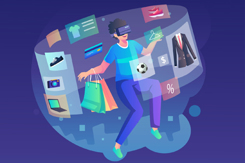Imagine a retail decision maker from 2012 jumps 10 years into the future. When they arrive in 2022, what would they see?
- Improve Operational Efficiency And Combat Fraud With Secure Real-Time Location Systems
- Turning Brick And Mortar Stores Into A Competitive Advantage
- 5 Ways To Harness The Power Of Urgency In Selling B2B Software
- 5 Questions You Must Ask When Choosing A 3PL Partner In 2023
- 3 Steps For Retailers To Protect Growing IT Systems From Cyberattacks
- Crafting The Future Of Retail With Composable Commerce
- Improving Holiday Resiliency And Efficiency By Filling Non-Transactional Automation Gaps
GUEST CONTRIBUTORS
-
Credit Card Swipe Fees Burden Merchants And Consumers
"Swipe fees" charged by credit card companies, which merchants must pay and often pass on to consumers, have become a high cost for businesses, leading to higher prices for goods and services.
-
U.S. Consumer Spending Is Weaker But Still Growing
U.S. consumer spending is declining, with a shift from goods to experiences like travel and dining out, potentially impacting the retail sector and signaling an uncertain economic future.
-
Doing Our Part For A Sustainable Future
As a response to global sustainability commitments and the pressing need to combat climate change, apg is taking proactive measures to reduce its carbon footprint through a number of green initiatives.
-
Report: Future Monetary Systems Must Include Cash
The debate over the future of cash centers on technology advancements, but neglects the social and economic implications of excluding those without digital access.
-
Once Considered Unsafe, Cash Now Offers Security
Using cash provides increased security and privacy compared to electronic payment methods, minimizing the risk of cyber theft and personal data exposure.
Retail Events
_Events_TimeDurationPriceVENDOR INSIGHTS
-
Credit Card Swipe Fees Burden Merchants And Consumers
"Swipe fees" charged by credit card companies, which merchants must pay and often pass on to consumers, have become a high cost for businesses, leading to higher prices for goods and services.
-
U.S. Consumer Spending Is Weaker But Still Growing
U.S. consumer spending is declining, with a shift from goods to experiences like travel and dining out, potentially impacting the retail sector and signaling an uncertain economic future.
-
Doing Our Part For A Sustainable Future
As a response to global sustainability commitments and the pressing need to combat climate change, apg is taking proactive measures to reduce its carbon footprint through a number of green initiatives.
-
Report: Future Monetary Systems Must Include Cash
The debate over the future of cash centers on technology advancements, but neglects the social and economic implications of excluding those without digital access.
-
Once Considered Unsafe, Cash Now Offers Security
Using cash provides increased security and privacy compared to electronic payment methods, minimizing the risk of cyber theft and personal data exposure.
-
“POS” Is No Longer A Four-Letter Word In The MSP Community
Many managed services vendors, who once rejected the retail vertical because it was a strange, new world to them, are now eager to enter our space and have already gained traction in pockets.









